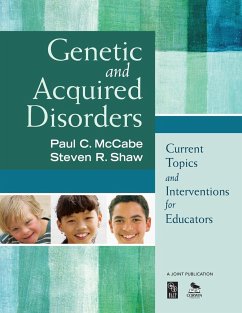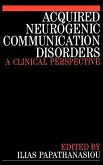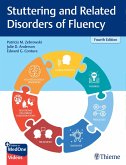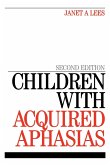Paul C. McCabe, Steven R. Shaw
Genetic and Acquired Disorders
Current Topics and Interventions for Educators
Schade – dieser Artikel ist leider ausverkauft. Sobald wir wissen, ob und wann der Artikel wieder verfügbar ist, informieren wir Sie an dieser Stelle.
Paul C. McCabe, Steven R. Shaw
Genetic and Acquired Disorders
Current Topics and Interventions for Educators
- Broschiertes Buch
- Merkliste
- Auf die Merkliste
- Bewerten Bewerten
- Teilen
- Produkt teilen
- Produkterinnerung
- Produkterinnerung
Written for school psychologists, counselors, administrators, and teachers, this volume outlines issues affecting children who are born with or acquire a medical disorder or disease.
Andere Kunden interessierten sich auch für
![Acquired Speech and Language Disorders Acquired Speech and Language Disorders]() Bruce E. MurdochAcquired Speech and Language Disorders87,99 €
Bruce E. MurdochAcquired Speech and Language Disorders87,99 €![Acquired Neurogenic Communication Disorders Acquired Neurogenic Communication Disorders]() Ilias PapathanasiouAcquired Neurogenic Communication Disorders82,99 €
Ilias PapathanasiouAcquired Neurogenic Communication Disorders82,99 €![The Role of Osteotomy in the Correction of Congenital and Acquired Disorders of the Skeleton The Role of Osteotomy in the Correction of Congenital and Acquired Disorders of the Skeleton]() The Role of Osteotomy in the Correction of Congenital and Acquired Disorders of the Skeleton101,99 €
The Role of Osteotomy in the Correction of Congenital and Acquired Disorders of the Skeleton101,99 €![Stuttering and Related Disorders of Fluency Stuttering and Related Disorders of Fluency]() Stuttering and Related Disorders of Fluency71,99 €
Stuttering and Related Disorders of Fluency71,99 €![Angioplasty, Various Techniques and Challenges in Treatment of Congenital and Acquired Vascular Stenoses Angioplasty, Various Techniques and Challenges in Treatment of Congenital and Acquired Vascular Stenoses]() Angioplasty, Various Techniques and Challenges in Treatment of Congenital and Acquired Vascular Stenoses84,99 €
Angioplasty, Various Techniques and Challenges in Treatment of Congenital and Acquired Vascular Stenoses84,99 €![Acquired Neuromuscular Disorders Acquired Neuromuscular Disorders]() Acquired Neuromuscular Disorders105,99 €
Acquired Neuromuscular Disorders105,99 €![Children with Acquired Aphasias Children with Acquired Aphasias]() Janet LeesChildren with Acquired Aphasias80,99 €
Janet LeesChildren with Acquired Aphasias80,99 €-
-
Written for school psychologists, counselors, administrators, and teachers, this volume outlines issues affecting children who are born with or acquire a medical disorder or disease.
Produktdetails
- Produktdetails
- Verlag: Corwin
- Artikelnr. des Verlages: B68713P
- Seitenzahl: 194
- Erscheinungstermin: 23. Februar 2010
- Englisch
- Abmessung: 280mm x 216mm x 11mm
- Gewicht: 503g
- ISBN-13: 9781412968720
- ISBN-10: 1412968720
- Artikelnr.: 26994329
- Herstellerkennzeichnung
- Libri GmbH
- Europaallee 1
- 36244 Bad Hersfeld
- gpsr@libri.de
- Verlag: Corwin
- Artikelnr. des Verlages: B68713P
- Seitenzahl: 194
- Erscheinungstermin: 23. Februar 2010
- Englisch
- Abmessung: 280mm x 216mm x 11mm
- Gewicht: 503g
- ISBN-13: 9781412968720
- ISBN-10: 1412968720
- Artikelnr.: 26994329
- Herstellerkennzeichnung
- Libri GmbH
- Europaallee 1
- 36244 Bad Hersfeld
- gpsr@libri.de
Paul C. McCabe, NCSP, is an associate professor of school psychology in the School Psychologist Graduate Program at Brooklyn College of the City University of New York. McCabe is a New York State certified school psychologist, New York State licensed psychologist, and a Nationally Certified School Psychologist (NCSP). He serves on the editorial boards of several publications in school psychology and developmental psychology, and has consulted at state and national levels on issues of early childhood assessment and best practices, pediatric issues in schools, and training in school psychology. McCabe conducts and publishes research in early childhood social, behavioral, and language development and concomitant problems; pediatric school psychology and health issues addressed by schools; and social justice issues in training, especially training educators to advocate for gay, lesbian, bisexual and transgendered youth. McCabe received his PhD in clinical and school psychology from Hofstra University. He holds undergraduate degrees from University of Rochester and Cazenovia College. Steven R. Shaw, NCSP, is an assistant professor in the Department of Educational and Counselling Psychology at McGill University in Montreal, Quebec. He has been a school psychologist since 1988 with clinical and administrative experience in schools, hospitals, and independent practice. He has conducted workshops and consulted with educational policy makers to address the needs of children with borderline intellectual functioning in the US, Canada, Pakistan, Moldova, Poland, India, and Egypt. Shaw conducts and publishes research in behavior and language development in children with rare genetic disorders; resilience factors for children with risk factors for school failure, especially borderline intellectual functioning; and pediatric school psychology and health issues addressed by schools. Shaw received a PhD in school psychology from the University of Florida.
Preface
Acknowledgments
Part I. Advances in Health Care and Coping with Loss in Schools
1. Advances in Health Care and Medical Science: Presenting New Challenges
for Schools - Paul C. McCabe, Steven R. Shaw
Advances in Medical Science
Increased Survival Rates
Greater Specificity of Medical Diagnosis and Treatment
Increased Emphasis on Outpatient Care
Changing Role of Schools
Increase in Pharmacological Interventions
Multidisciplinary Approach
References
2. Grief and Bereavement: Roles for Educators - Steven R. Shaw, Tiffany
Chiu, Khing Su Lin
Introduction
Background
Implications for Educators
How to Tell Students about a Death
Notification and Announcement Procedures
Parent Notification
Determine the Degree of Trauma
Concerns about Death due to Suicide
Educational Strategies
Discussion Questions
Research Summary
Handout-Grief and Bereveament in the Schools
Part II. Chromosomal, Genetic, and Metabolic Disorders
3. Rare Chromosomal Disorders - Shohreh M. Rezazadeh, Steven R. Shaw
Introduction
Background
Genetics Evaluation
Chromosomal Abnormalities
Potential for Intervention
Future Work
Implications for Educators
Educational Strategies
Discussion Questions
Research Summary
Handout-Children with Rare Chromosomal Disorders
4. Phenylketonuria (PKU): Implications for Educators and Schools - Paul C.
McCabe, Lindsay Glasser
Introduction
Background
Prevalence, Symptoms and Treatment
Cognitive and Neurological Effects
Executive dysfunction
Maternal Phenylketonuria
Timing and Degree of Exposure
Implications for Educators
Dietary Compliance
Educational Strategies
Discussion Questions
Research Summary
Handout-Phenylketonuria (PKU)
5. Genetics of Autism: Theories, Findings, and Implications - Sarah Glaser,
Tia Ouimet
Introduction
Background
Knowing Which Families Are At Risk
Techniques to Identify Genetic Contributions
Known Genetic Causes
X-linked genes
Chromosomal Duplications
Chromosomal Deletions
Candidate Genes
Multiple Gene Complications and Unknowns
Possible Environmental Causes
The Role of Genetic Counseling and Testing
Implications for Educators
Home- and School-based Treatment and Interventions
Educational Strategies
Discussion Questions
Research Summary
Handout-The Genetics of Autism
6. The Biology of Shyness - Paul C. McCabe, Sarah Groark, Brian Dalpiaz
Introduction
Background
The Role of the Amygdala
Amygdala and Cortisol Levels: The HPA System
Psychological and Immune Correlates of HPA Activation
Implications for Educators
Educational Strategies
Discussion Questions
Research Summary
Handout-The Shyness in Children
7. Families of Children with Genetic Disorders - Jennifer E. Bruce, Sara
Quirke, Steven R. Shaw
Introduction
Background
Asking Questions of Professionals
Managing Emotional Trauma
Stresses Faced by Families of Children with Genetic Disorders
Mothers of Children with Genetic Disorders
Fathers of Children with Genetic Disorders
Marital Stress in Families of Children with Genetic Disabilities
Siblings of Children with Genetic Disabilities
Increased Responsibilities of Siblings
Strengths in Families of Children with Genetic Disorders
Family Resilience
Positive Changes in Sibling Development
Educational Strategies
Discussion Questions
Research Summary
Handout-Helping Families with a Child with a Disability
Part III. Acquired Disorders of Childhood
8. Prenatal Alcohol Exposure: Biological and Behavioral Outcomes - Erica J.
Deming, Paul C. McCabe
Introduction
Background
Neuroanatomical Effects of Prenatal Alcohol Exposure
Alcohol's Effect on the Neocortex, Hippocampus, Cerebellum, and
Neurotransmission
Neocortex
Hippocampus
Cerebellum
Neuronal level
Typical Anatomical Features of Children with Fetal Alcohol Exposure
Neurobehavioral Effects of Prenatal Alcohol Exposure
Implications for Educators
Educational Strategies
Discussion Questions
Research Summary
Handout-Effects of Prenatal Alcohol Exposure on Children
9. Prenatal Exposure to Antidepressants - Paul C. McCabe, Caryn R. Depinna
Introduction
Background
Types of Antidepressants
Selective Serotonin Reuptake Inhibitors (SSRIs)
Tricyclic Antidepressants (TCAs)
Monoamine Oxidase Inhibitors (MAOIs)
Untreated Depression
Conclusion
Implications for Educators
Educational Strategies
Discussion Questions
Research Summary
Handout-Information about Prenatal Exposure to Antidepressants
10. Celiac Disease and Youth: Implications for Educators and Allied
Professionals - Jessica B. Edwards, Jessica blom-Hoffman, Debra L. Franko
Introduction
Background
Prevalence
Symptoms
Diagnosis
Treatment: The Gluten-Free Diet
Issues in the Treatment of Celiac Disease
Complications and Consequences of Untreated Celiac Disease
Dietary Adherence
Barriers to Dietary Adherence
Co-morbidity in CD
Implications for Educators
Strategies to Support Students with CD
Support the child with CD
Support the adults
Dietary adherence
Managing pain
Toileting needs
School absenteeism
Psychological treatment and evaluation
Educational Strategies
Discussion Questions
Research Summary
Handout-Celiac Disease: Helpful Hints for Educators
11. Post-partum Depression and its Relation to Behavior Problems in
Children - Denielle Parente, Paul McCabe
Introduction
Background
Maternal Depression and Childhood ADHD
Child-Family Dynamics
Implications for Educators
Educational Strategies
Discussion Questions
Research Summary
Handout-Identifying and Treating Post-partum Depression
12. Pediatric Responses to Asthma: An Overview for Educators - Adrienne
Garro
Introduction
Background
Experience of Symptoms
Impact on Student Functioning
Psychosocial Implications
Implications for Educators
Educational Strategies
Discussion Questions
Research Summary
Handout-Pediatric Responses to Asthma
13. Food Allergies and Intolerances: What Educators Need to Know - Doris
Paez, Gilliam W. Thomas
Introduction
Background
What is a Food Allergy?
How Can an Allergy Cause Death?
How Do Food Allergies Develop?
Does Food Allergy Management Differ by Developmental Stage?
What Social-emotional or Behavioral Issues are Associated with Food
Allergies?
What is the Status of Research on Causes and Treatments?
Implications for Educators
Create a Core Team
Food Allergy Emergency Plan
Storing of Medications
Label Literacy
Empowering Children with Food Allergies and their Peers
Educational Strategies
Discussion Questions
Research Summary
Handout- Successfuly Managing Food Allergies in Childhood
14. Developmental Effects of Type 1 Diabetes - Sarah A. B. Wilson, W. Mark
Posey, Elizabeth M. Schnieder
Introduction
Background
Acute Effects
Long-Term Effects
Physical Effects
Cognitive Effects
Academic Achievement
Social-Emotional Functioning
Implications for Educators
Educational Strategies
Discussion Questions
Research Summary
Handout-General Information about Type 1 Diabetes
Appendix
Glossary
References
Index
Acknowledgments
Part I. Advances in Health Care and Coping with Loss in Schools
1. Advances in Health Care and Medical Science: Presenting New Challenges
for Schools - Paul C. McCabe, Steven R. Shaw
Advances in Medical Science
Increased Survival Rates
Greater Specificity of Medical Diagnosis and Treatment
Increased Emphasis on Outpatient Care
Changing Role of Schools
Increase in Pharmacological Interventions
Multidisciplinary Approach
References
2. Grief and Bereavement: Roles for Educators - Steven R. Shaw, Tiffany
Chiu, Khing Su Lin
Introduction
Background
Implications for Educators
How to Tell Students about a Death
Notification and Announcement Procedures
Parent Notification
Determine the Degree of Trauma
Concerns about Death due to Suicide
Educational Strategies
Discussion Questions
Research Summary
Handout-Grief and Bereveament in the Schools
Part II. Chromosomal, Genetic, and Metabolic Disorders
3. Rare Chromosomal Disorders - Shohreh M. Rezazadeh, Steven R. Shaw
Introduction
Background
Genetics Evaluation
Chromosomal Abnormalities
Potential for Intervention
Future Work
Implications for Educators
Educational Strategies
Discussion Questions
Research Summary
Handout-Children with Rare Chromosomal Disorders
4. Phenylketonuria (PKU): Implications for Educators and Schools - Paul C.
McCabe, Lindsay Glasser
Introduction
Background
Prevalence, Symptoms and Treatment
Cognitive and Neurological Effects
Executive dysfunction
Maternal Phenylketonuria
Timing and Degree of Exposure
Implications for Educators
Dietary Compliance
Educational Strategies
Discussion Questions
Research Summary
Handout-Phenylketonuria (PKU)
5. Genetics of Autism: Theories, Findings, and Implications - Sarah Glaser,
Tia Ouimet
Introduction
Background
Knowing Which Families Are At Risk
Techniques to Identify Genetic Contributions
Known Genetic Causes
X-linked genes
Chromosomal Duplications
Chromosomal Deletions
Candidate Genes
Multiple Gene Complications and Unknowns
Possible Environmental Causes
The Role of Genetic Counseling and Testing
Implications for Educators
Home- and School-based Treatment and Interventions
Educational Strategies
Discussion Questions
Research Summary
Handout-The Genetics of Autism
6. The Biology of Shyness - Paul C. McCabe, Sarah Groark, Brian Dalpiaz
Introduction
Background
The Role of the Amygdala
Amygdala and Cortisol Levels: The HPA System
Psychological and Immune Correlates of HPA Activation
Implications for Educators
Educational Strategies
Discussion Questions
Research Summary
Handout-The Shyness in Children
7. Families of Children with Genetic Disorders - Jennifer E. Bruce, Sara
Quirke, Steven R. Shaw
Introduction
Background
Asking Questions of Professionals
Managing Emotional Trauma
Stresses Faced by Families of Children with Genetic Disorders
Mothers of Children with Genetic Disorders
Fathers of Children with Genetic Disorders
Marital Stress in Families of Children with Genetic Disabilities
Siblings of Children with Genetic Disabilities
Increased Responsibilities of Siblings
Strengths in Families of Children with Genetic Disorders
Family Resilience
Positive Changes in Sibling Development
Educational Strategies
Discussion Questions
Research Summary
Handout-Helping Families with a Child with a Disability
Part III. Acquired Disorders of Childhood
8. Prenatal Alcohol Exposure: Biological and Behavioral Outcomes - Erica J.
Deming, Paul C. McCabe
Introduction
Background
Neuroanatomical Effects of Prenatal Alcohol Exposure
Alcohol's Effect on the Neocortex, Hippocampus, Cerebellum, and
Neurotransmission
Neocortex
Hippocampus
Cerebellum
Neuronal level
Typical Anatomical Features of Children with Fetal Alcohol Exposure
Neurobehavioral Effects of Prenatal Alcohol Exposure
Implications for Educators
Educational Strategies
Discussion Questions
Research Summary
Handout-Effects of Prenatal Alcohol Exposure on Children
9. Prenatal Exposure to Antidepressants - Paul C. McCabe, Caryn R. Depinna
Introduction
Background
Types of Antidepressants
Selective Serotonin Reuptake Inhibitors (SSRIs)
Tricyclic Antidepressants (TCAs)
Monoamine Oxidase Inhibitors (MAOIs)
Untreated Depression
Conclusion
Implications for Educators
Educational Strategies
Discussion Questions
Research Summary
Handout-Information about Prenatal Exposure to Antidepressants
10. Celiac Disease and Youth: Implications for Educators and Allied
Professionals - Jessica B. Edwards, Jessica blom-Hoffman, Debra L. Franko
Introduction
Background
Prevalence
Symptoms
Diagnosis
Treatment: The Gluten-Free Diet
Issues in the Treatment of Celiac Disease
Complications and Consequences of Untreated Celiac Disease
Dietary Adherence
Barriers to Dietary Adherence
Co-morbidity in CD
Implications for Educators
Strategies to Support Students with CD
Support the child with CD
Support the adults
Dietary adherence
Managing pain
Toileting needs
School absenteeism
Psychological treatment and evaluation
Educational Strategies
Discussion Questions
Research Summary
Handout-Celiac Disease: Helpful Hints for Educators
11. Post-partum Depression and its Relation to Behavior Problems in
Children - Denielle Parente, Paul McCabe
Introduction
Background
Maternal Depression and Childhood ADHD
Child-Family Dynamics
Implications for Educators
Educational Strategies
Discussion Questions
Research Summary
Handout-Identifying and Treating Post-partum Depression
12. Pediatric Responses to Asthma: An Overview for Educators - Adrienne
Garro
Introduction
Background
Experience of Symptoms
Impact on Student Functioning
Psychosocial Implications
Implications for Educators
Educational Strategies
Discussion Questions
Research Summary
Handout-Pediatric Responses to Asthma
13. Food Allergies and Intolerances: What Educators Need to Know - Doris
Paez, Gilliam W. Thomas
Introduction
Background
What is a Food Allergy?
How Can an Allergy Cause Death?
How Do Food Allergies Develop?
Does Food Allergy Management Differ by Developmental Stage?
What Social-emotional or Behavioral Issues are Associated with Food
Allergies?
What is the Status of Research on Causes and Treatments?
Implications for Educators
Create a Core Team
Food Allergy Emergency Plan
Storing of Medications
Label Literacy
Empowering Children with Food Allergies and their Peers
Educational Strategies
Discussion Questions
Research Summary
Handout- Successfuly Managing Food Allergies in Childhood
14. Developmental Effects of Type 1 Diabetes - Sarah A. B. Wilson, W. Mark
Posey, Elizabeth M. Schnieder
Introduction
Background
Acute Effects
Long-Term Effects
Physical Effects
Cognitive Effects
Academic Achievement
Social-Emotional Functioning
Implications for Educators
Educational Strategies
Discussion Questions
Research Summary
Handout-General Information about Type 1 Diabetes
Appendix
Glossary
References
Index
Preface
Acknowledgments
Part I. Advances in Health Care and Coping with Loss in Schools
1. Advances in Health Care and Medical Science: Presenting New Challenges
for Schools - Paul C. McCabe, Steven R. Shaw
Advances in Medical Science
Increased Survival Rates
Greater Specificity of Medical Diagnosis and Treatment
Increased Emphasis on Outpatient Care
Changing Role of Schools
Increase in Pharmacological Interventions
Multidisciplinary Approach
References
2. Grief and Bereavement: Roles for Educators - Steven R. Shaw, Tiffany
Chiu, Khing Su Lin
Introduction
Background
Implications for Educators
How to Tell Students about a Death
Notification and Announcement Procedures
Parent Notification
Determine the Degree of Trauma
Concerns about Death due to Suicide
Educational Strategies
Discussion Questions
Research Summary
Handout-Grief and Bereveament in the Schools
Part II. Chromosomal, Genetic, and Metabolic Disorders
3. Rare Chromosomal Disorders - Shohreh M. Rezazadeh, Steven R. Shaw
Introduction
Background
Genetics Evaluation
Chromosomal Abnormalities
Potential for Intervention
Future Work
Implications for Educators
Educational Strategies
Discussion Questions
Research Summary
Handout-Children with Rare Chromosomal Disorders
4. Phenylketonuria (PKU): Implications for Educators and Schools - Paul C.
McCabe, Lindsay Glasser
Introduction
Background
Prevalence, Symptoms and Treatment
Cognitive and Neurological Effects
Executive dysfunction
Maternal Phenylketonuria
Timing and Degree of Exposure
Implications for Educators
Dietary Compliance
Educational Strategies
Discussion Questions
Research Summary
Handout-Phenylketonuria (PKU)
5. Genetics of Autism: Theories, Findings, and Implications - Sarah Glaser,
Tia Ouimet
Introduction
Background
Knowing Which Families Are At Risk
Techniques to Identify Genetic Contributions
Known Genetic Causes
X-linked genes
Chromosomal Duplications
Chromosomal Deletions
Candidate Genes
Multiple Gene Complications and Unknowns
Possible Environmental Causes
The Role of Genetic Counseling and Testing
Implications for Educators
Home- and School-based Treatment and Interventions
Educational Strategies
Discussion Questions
Research Summary
Handout-The Genetics of Autism
6. The Biology of Shyness - Paul C. McCabe, Sarah Groark, Brian Dalpiaz
Introduction
Background
The Role of the Amygdala
Amygdala and Cortisol Levels: The HPA System
Psychological and Immune Correlates of HPA Activation
Implications for Educators
Educational Strategies
Discussion Questions
Research Summary
Handout-The Shyness in Children
7. Families of Children with Genetic Disorders - Jennifer E. Bruce, Sara
Quirke, Steven R. Shaw
Introduction
Background
Asking Questions of Professionals
Managing Emotional Trauma
Stresses Faced by Families of Children with Genetic Disorders
Mothers of Children with Genetic Disorders
Fathers of Children with Genetic Disorders
Marital Stress in Families of Children with Genetic Disabilities
Siblings of Children with Genetic Disabilities
Increased Responsibilities of Siblings
Strengths in Families of Children with Genetic Disorders
Family Resilience
Positive Changes in Sibling Development
Educational Strategies
Discussion Questions
Research Summary
Handout-Helping Families with a Child with a Disability
Part III. Acquired Disorders of Childhood
8. Prenatal Alcohol Exposure: Biological and Behavioral Outcomes - Erica J.
Deming, Paul C. McCabe
Introduction
Background
Neuroanatomical Effects of Prenatal Alcohol Exposure
Alcohol's Effect on the Neocortex, Hippocampus, Cerebellum, and
Neurotransmission
Neocortex
Hippocampus
Cerebellum
Neuronal level
Typical Anatomical Features of Children with Fetal Alcohol Exposure
Neurobehavioral Effects of Prenatal Alcohol Exposure
Implications for Educators
Educational Strategies
Discussion Questions
Research Summary
Handout-Effects of Prenatal Alcohol Exposure on Children
9. Prenatal Exposure to Antidepressants - Paul C. McCabe, Caryn R. Depinna
Introduction
Background
Types of Antidepressants
Selective Serotonin Reuptake Inhibitors (SSRIs)
Tricyclic Antidepressants (TCAs)
Monoamine Oxidase Inhibitors (MAOIs)
Untreated Depression
Conclusion
Implications for Educators
Educational Strategies
Discussion Questions
Research Summary
Handout-Information about Prenatal Exposure to Antidepressants
10. Celiac Disease and Youth: Implications for Educators and Allied
Professionals - Jessica B. Edwards, Jessica blom-Hoffman, Debra L. Franko
Introduction
Background
Prevalence
Symptoms
Diagnosis
Treatment: The Gluten-Free Diet
Issues in the Treatment of Celiac Disease
Complications and Consequences of Untreated Celiac Disease
Dietary Adherence
Barriers to Dietary Adherence
Co-morbidity in CD
Implications for Educators
Strategies to Support Students with CD
Support the child with CD
Support the adults
Dietary adherence
Managing pain
Toileting needs
School absenteeism
Psychological treatment and evaluation
Educational Strategies
Discussion Questions
Research Summary
Handout-Celiac Disease: Helpful Hints for Educators
11. Post-partum Depression and its Relation to Behavior Problems in
Children - Denielle Parente, Paul McCabe
Introduction
Background
Maternal Depression and Childhood ADHD
Child-Family Dynamics
Implications for Educators
Educational Strategies
Discussion Questions
Research Summary
Handout-Identifying and Treating Post-partum Depression
12. Pediatric Responses to Asthma: An Overview for Educators - Adrienne
Garro
Introduction
Background
Experience of Symptoms
Impact on Student Functioning
Psychosocial Implications
Implications for Educators
Educational Strategies
Discussion Questions
Research Summary
Handout-Pediatric Responses to Asthma
13. Food Allergies and Intolerances: What Educators Need to Know - Doris
Paez, Gilliam W. Thomas
Introduction
Background
What is a Food Allergy?
How Can an Allergy Cause Death?
How Do Food Allergies Develop?
Does Food Allergy Management Differ by Developmental Stage?
What Social-emotional or Behavioral Issues are Associated with Food
Allergies?
What is the Status of Research on Causes and Treatments?
Implications for Educators
Create a Core Team
Food Allergy Emergency Plan
Storing of Medications
Label Literacy
Empowering Children with Food Allergies and their Peers
Educational Strategies
Discussion Questions
Research Summary
Handout- Successfuly Managing Food Allergies in Childhood
14. Developmental Effects of Type 1 Diabetes - Sarah A. B. Wilson, W. Mark
Posey, Elizabeth M. Schnieder
Introduction
Background
Acute Effects
Long-Term Effects
Physical Effects
Cognitive Effects
Academic Achievement
Social-Emotional Functioning
Implications for Educators
Educational Strategies
Discussion Questions
Research Summary
Handout-General Information about Type 1 Diabetes
Appendix
Glossary
References
Index
Acknowledgments
Part I. Advances in Health Care and Coping with Loss in Schools
1. Advances in Health Care and Medical Science: Presenting New Challenges
for Schools - Paul C. McCabe, Steven R. Shaw
Advances in Medical Science
Increased Survival Rates
Greater Specificity of Medical Diagnosis and Treatment
Increased Emphasis on Outpatient Care
Changing Role of Schools
Increase in Pharmacological Interventions
Multidisciplinary Approach
References
2. Grief and Bereavement: Roles for Educators - Steven R. Shaw, Tiffany
Chiu, Khing Su Lin
Introduction
Background
Implications for Educators
How to Tell Students about a Death
Notification and Announcement Procedures
Parent Notification
Determine the Degree of Trauma
Concerns about Death due to Suicide
Educational Strategies
Discussion Questions
Research Summary
Handout-Grief and Bereveament in the Schools
Part II. Chromosomal, Genetic, and Metabolic Disorders
3. Rare Chromosomal Disorders - Shohreh M. Rezazadeh, Steven R. Shaw
Introduction
Background
Genetics Evaluation
Chromosomal Abnormalities
Potential for Intervention
Future Work
Implications for Educators
Educational Strategies
Discussion Questions
Research Summary
Handout-Children with Rare Chromosomal Disorders
4. Phenylketonuria (PKU): Implications for Educators and Schools - Paul C.
McCabe, Lindsay Glasser
Introduction
Background
Prevalence, Symptoms and Treatment
Cognitive and Neurological Effects
Executive dysfunction
Maternal Phenylketonuria
Timing and Degree of Exposure
Implications for Educators
Dietary Compliance
Educational Strategies
Discussion Questions
Research Summary
Handout-Phenylketonuria (PKU)
5. Genetics of Autism: Theories, Findings, and Implications - Sarah Glaser,
Tia Ouimet
Introduction
Background
Knowing Which Families Are At Risk
Techniques to Identify Genetic Contributions
Known Genetic Causes
X-linked genes
Chromosomal Duplications
Chromosomal Deletions
Candidate Genes
Multiple Gene Complications and Unknowns
Possible Environmental Causes
The Role of Genetic Counseling and Testing
Implications for Educators
Home- and School-based Treatment and Interventions
Educational Strategies
Discussion Questions
Research Summary
Handout-The Genetics of Autism
6. The Biology of Shyness - Paul C. McCabe, Sarah Groark, Brian Dalpiaz
Introduction
Background
The Role of the Amygdala
Amygdala and Cortisol Levels: The HPA System
Psychological and Immune Correlates of HPA Activation
Implications for Educators
Educational Strategies
Discussion Questions
Research Summary
Handout-The Shyness in Children
7. Families of Children with Genetic Disorders - Jennifer E. Bruce, Sara
Quirke, Steven R. Shaw
Introduction
Background
Asking Questions of Professionals
Managing Emotional Trauma
Stresses Faced by Families of Children with Genetic Disorders
Mothers of Children with Genetic Disorders
Fathers of Children with Genetic Disorders
Marital Stress in Families of Children with Genetic Disabilities
Siblings of Children with Genetic Disabilities
Increased Responsibilities of Siblings
Strengths in Families of Children with Genetic Disorders
Family Resilience
Positive Changes in Sibling Development
Educational Strategies
Discussion Questions
Research Summary
Handout-Helping Families with a Child with a Disability
Part III. Acquired Disorders of Childhood
8. Prenatal Alcohol Exposure: Biological and Behavioral Outcomes - Erica J.
Deming, Paul C. McCabe
Introduction
Background
Neuroanatomical Effects of Prenatal Alcohol Exposure
Alcohol's Effect on the Neocortex, Hippocampus, Cerebellum, and
Neurotransmission
Neocortex
Hippocampus
Cerebellum
Neuronal level
Typical Anatomical Features of Children with Fetal Alcohol Exposure
Neurobehavioral Effects of Prenatal Alcohol Exposure
Implications for Educators
Educational Strategies
Discussion Questions
Research Summary
Handout-Effects of Prenatal Alcohol Exposure on Children
9. Prenatal Exposure to Antidepressants - Paul C. McCabe, Caryn R. Depinna
Introduction
Background
Types of Antidepressants
Selective Serotonin Reuptake Inhibitors (SSRIs)
Tricyclic Antidepressants (TCAs)
Monoamine Oxidase Inhibitors (MAOIs)
Untreated Depression
Conclusion
Implications for Educators
Educational Strategies
Discussion Questions
Research Summary
Handout-Information about Prenatal Exposure to Antidepressants
10. Celiac Disease and Youth: Implications for Educators and Allied
Professionals - Jessica B. Edwards, Jessica blom-Hoffman, Debra L. Franko
Introduction
Background
Prevalence
Symptoms
Diagnosis
Treatment: The Gluten-Free Diet
Issues in the Treatment of Celiac Disease
Complications and Consequences of Untreated Celiac Disease
Dietary Adherence
Barriers to Dietary Adherence
Co-morbidity in CD
Implications for Educators
Strategies to Support Students with CD
Support the child with CD
Support the adults
Dietary adherence
Managing pain
Toileting needs
School absenteeism
Psychological treatment and evaluation
Educational Strategies
Discussion Questions
Research Summary
Handout-Celiac Disease: Helpful Hints for Educators
11. Post-partum Depression and its Relation to Behavior Problems in
Children - Denielle Parente, Paul McCabe
Introduction
Background
Maternal Depression and Childhood ADHD
Child-Family Dynamics
Implications for Educators
Educational Strategies
Discussion Questions
Research Summary
Handout-Identifying and Treating Post-partum Depression
12. Pediatric Responses to Asthma: An Overview for Educators - Adrienne
Garro
Introduction
Background
Experience of Symptoms
Impact on Student Functioning
Psychosocial Implications
Implications for Educators
Educational Strategies
Discussion Questions
Research Summary
Handout-Pediatric Responses to Asthma
13. Food Allergies and Intolerances: What Educators Need to Know - Doris
Paez, Gilliam W. Thomas
Introduction
Background
What is a Food Allergy?
How Can an Allergy Cause Death?
How Do Food Allergies Develop?
Does Food Allergy Management Differ by Developmental Stage?
What Social-emotional or Behavioral Issues are Associated with Food
Allergies?
What is the Status of Research on Causes and Treatments?
Implications for Educators
Create a Core Team
Food Allergy Emergency Plan
Storing of Medications
Label Literacy
Empowering Children with Food Allergies and their Peers
Educational Strategies
Discussion Questions
Research Summary
Handout- Successfuly Managing Food Allergies in Childhood
14. Developmental Effects of Type 1 Diabetes - Sarah A. B. Wilson, W. Mark
Posey, Elizabeth M. Schnieder
Introduction
Background
Acute Effects
Long-Term Effects
Physical Effects
Cognitive Effects
Academic Achievement
Social-Emotional Functioning
Implications for Educators
Educational Strategies
Discussion Questions
Research Summary
Handout-General Information about Type 1 Diabetes
Appendix
Glossary
References
Index









